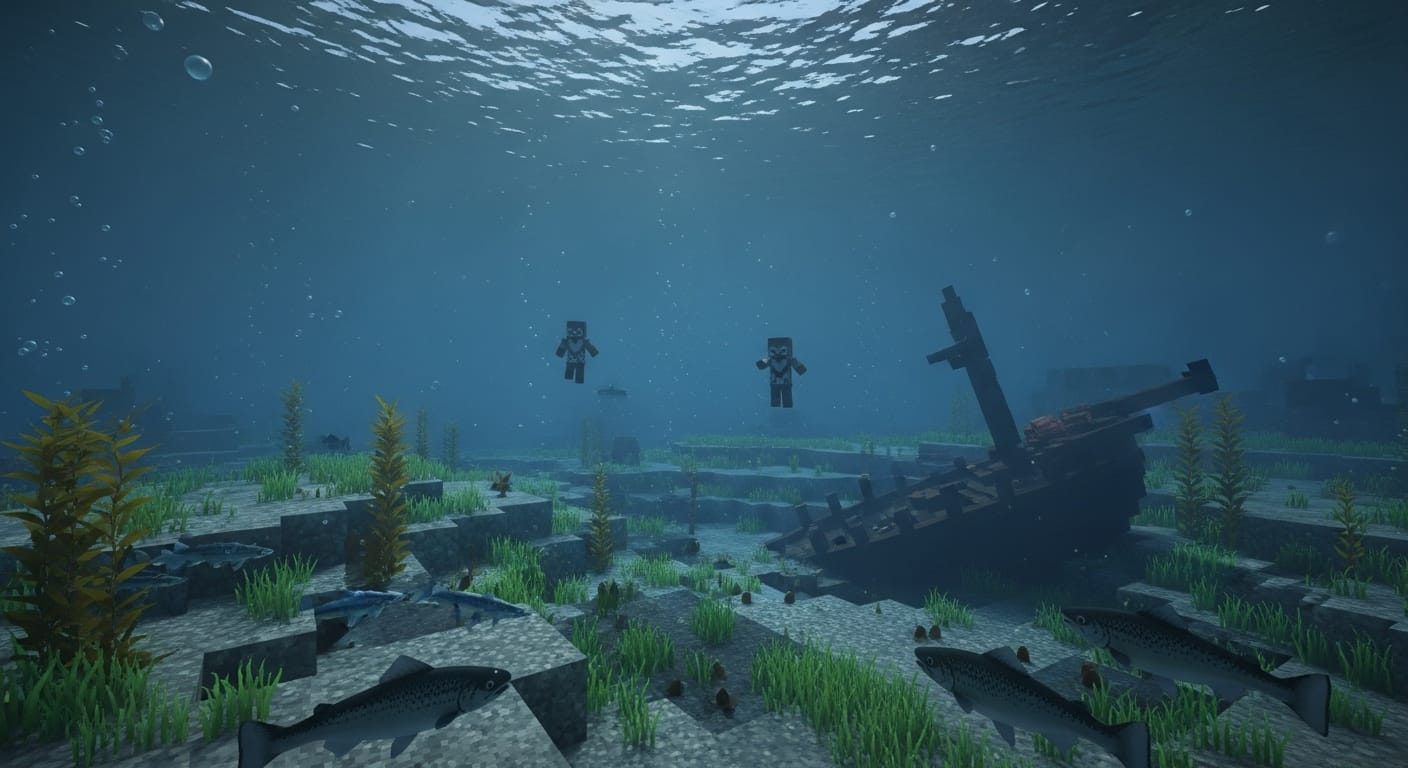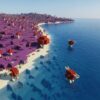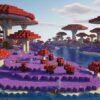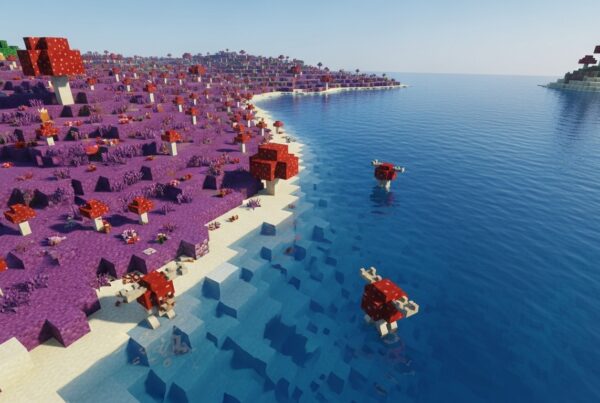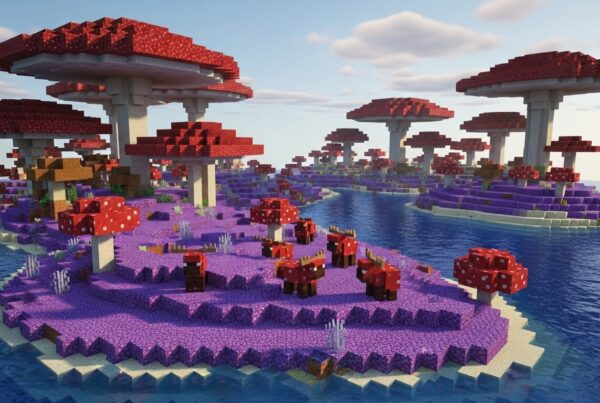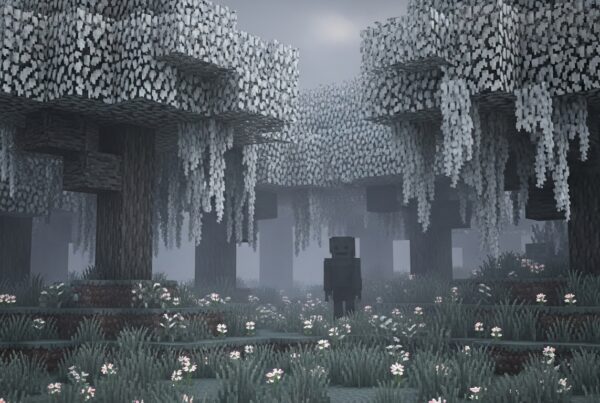The Cold Ocean Biome is one of Minecraft’s temperate ocean variants, known for its chilly blue waters, gravel seafloor, and subdued color palette. It serves as a midpoint between the Lukewarm Ocean and Frozen Ocean biomes, often generating alongside Taiga and Stone Shore coasts. While less vibrant than warm oceans, it’s a rich source of kelp, fish, and underwater structures such as shipwrecks and ocean ruins.
Introduced in Minecraft Java Edition 1.13 – The Update Aquatic, Cold Oceans brought new depth to the game’s marine exploration experience.
Biome Summary
| Feature | Details |
|---|---|
| Biome ID (Java) | minecraft:cold_ocean |
| Biome ID (Bedrock) | cold_ocean |
| Category | Ocean |
| Temperature | 0.5 |
| Downfall | 0.5 |
| Depth | ~45–63 blocks |
| Precipitation | Rain |
| Structures | Shipwrecks, Ocean Ruins (Cold), Ruined Portals, Ocean Monuments (Deep variant) |
| Color Palette | Water Color: #3D57A1 • Fog Color: #041F33 |
| Introduced In | 1.13 (Update Aquatic) |
Climate and Generation
Cold Oceans are generated between Frozen Oceans and Lukewarm Oceans, making them a natural temperature transition zone. They are often bordered by Taiga, Stone Shore, or Snowy Beach biomes.
Environmental Characteristics:
- Water Color: Dark blue-gray tones.
- Fog Color: Deep navy underwater fog.
- Surface: Primarily gravel, with sand and clay patches.
- Lighting: Normal underwater brightness.
- Weather: Rain only — no snow forms here.
Typical Borders:
- Frozen Ocean → Cold Ocean → Lukewarm Ocean
- Taiga / Snowy Beach → Cold Ocean
Flora and Terrain
The seafloor of the Cold Ocean is primarily gravel, with smaller patches of sand and clay. Vegetation is moderate — kelp and seagrass grow here, though less abundantly than in warmer biomes.
| Plant | Presence | Notes |
|---|---|---|
| Kelp | Common | Tall stalks, good for fuel and food. |
| Seagrass | Sparse | Found in patches across the gravel floor. |
| Coral | None | Coral reefs spawn only in Warm Oceans. |
💡 Tip: The Cold Ocean’s lower vegetation density makes it easier to spot ruins and shipwrecks compared to lush warm oceans.
Mobs and Spawning
| Mob | Type | Spawn Conditions |
|---|---|---|
| Cod | Passive | Common at all depths. |
| Salmon | Passive | Found in schools of 3–5. |
| Squid | Passive | Spawns in mid to upper depths. |
| Dolphin | Neutral | Occasionally spawns, can lead to structures. |
| Drowned | Hostile | Common near ocean ruins and at night. |
| Glow Squid | Passive | Does not spawn in Cold Oceans — only in underground water caves. |
| Tropical Fish / Pufferfish | — | Do not spawn here. |
Spawn Notes:
- Drowned spawn rates are slightly higher than in Lukewarm Oceans.
- Dolphins can spawn but are rarer than in warm biomes.
- Cold Ocean mobs are similar to Frozen Oceans, minus ice interference.
Structures and Generation
⚓ Common Structures
| Structure | Features | Notes |
|---|---|---|
| Shipwrecks | Wooden ruins above or below seafloor. | Contain treasure maps, enchanted items, food, and iron. |
| Ocean Ruins (Cold Variant) | Built from stone brick and mossy stone. | Frequently guarded by Drowned; contain buried loot. |
| Ruined Portals | Nether-themed structures. | Rare, but can spawn underwater with loot chests. |
| Ocean Monuments (Deep Cold Ocean only) | Large prismarine structures guarded by Guardians. | Rare but confirmed to generate in Deep Cold Ocean biomes. |
Resources and Loot
| Resource | Source | Uses |
|---|---|---|
| Kelp | Natural vegetation | Food, smelting fuel, dried kelp blocks. |
| Fish (Cod, Salmon) | Mobs | Food, trading with Fisher villagers. |
| Ink Sacs | Squid drops | Dye, book & quill crafting. |
| Clay & Gravel | Seafloor | Bricks, concrete, building. |
| Treasure Loot | Shipwrecks / Ruins | Enchanted gear, gold, iron, emeralds, buried treasure maps. |
🪸 Pro Tip: Use Night Vision and Water Breathing potions to safely search the ocean floor for hidden chests among ruins.
Variants
🌊 Cold Ocean
- Moderate depth (~45 blocks).
- Balanced mix of kelp and seagrass.
- Common passive mob spawns.
- No Ocean Monuments.
🌊 Deep Cold Ocean
- Double the depth of normal Cold Oceans (~70–90 blocks).
- Much darker, with fewer plants.
- More Drowned spawns.
- Ocean Monuments can generate here.
- Ideal for resource farming and exploration challenges.
Survival & Exploration Tips
- Visibility: Use Potion of Night Vision to reveal structures.
- Mob Combat: Watch for Drowned with tridents — use shields or ranged weapons.
- Movement: Depth Strider boots and Aqua Affinity helmets make exploration smoother.
- Breathing: Potions or Turtle Shell helmets extend dive time.
- Travel: Boats are essential for navigation and quick escape.
- Loot Marking: Place torches or kelp markers near explored ruins.
Technical Information
| Setting | Value |
|---|---|
| Biome ID (Java) | minecraft:cold_ocean |
| Biome ID (Bedrock) | cold_ocean |
| Temperature | 0.5 |
| Downfall | 0.5 |
| Category | Ocean |
| Depth Range | Y=45–63 |
| Water Color | #3D57A1 |
| Water Fog Color | #041F33 |
| Grass / Foliage Color | Default Ocean palette |
Locate Command Example:
/locate biome minecraft:cold_oceanThis command helps players quickly find Cold Ocean biomes in Java Edition.
Comparison With Similar Biomes
| Biome | Temperature | Unique Traits |
|---|---|---|
| Frozen Ocean | 0.0 | Ice-covered surface, polar bears, and packed ice. |
| Cold Ocean | 0.5 | Gravel floors, kelp, and cod/salmon spawns. |
| Lukewarm Ocean | 0.8 | Sand floors, tropical fish, coral reefs. |
| Warm Ocean | 1.0 | Coral reefs, sea pickles, colorful fish. |
Update History
| Version | Change |
|---|---|
| 1.13 (Java) | Introduced as part of The Update Aquatic; added ocean variants. |
| 1.16+ | Improved structure generation and Drowned behavior. |
| 1.18+ | Terrain generation adjusted to deeper seafloors; structures spawn more naturally. |
Trivia
- Cold Ocean ruins use a unique mossy stone design different from warm ocean ruins.
- Drowned are more likely to spawn carrying tridents here than in warmer oceans.
- One of the best biomes for kelp farming due to wide seafloor spread.
- The muted palette makes it a favorite for realistic underwater builds.
Conclusion
The Cold Ocean Biome may appear bleak, but it’s one of Minecraft’s most atmospheric and rewarding underwater regions. Its calm blue waters conceal ruins, shipwrecks, and treasures — perfect for explorers and builders alike. Whether farming kelp, looting shipwrecks, or battling Drowned, the Cold Ocean offers a peaceful yet mysterious experience beneath the waves.
See Also: [Frozen Ocean Biome] • [Deep Ocean Biome] • [Lukewarm Ocean Biome]
